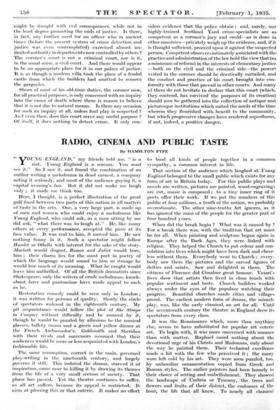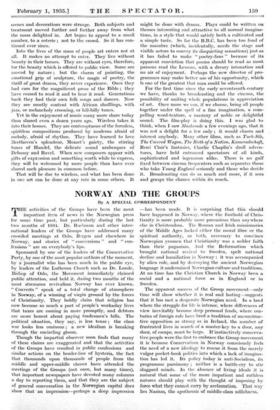RADIO, CINEMA AND PUBLIC TASTE
By HAMILTON FY-FE YOUNG ENGLAND," my friends told me, " is a riot. Young England is a scream. You must see it." So I saw it, and found the combination of an author writing a melodrama in dead earnest, a company acting it seriously, and most of the audience guying it, a capital evening's fun. But it did not make me laugh only ; it made me think too.
Here, I thought, is a perfect illustration of the great gulf fixed between two parts of this nation in all matters of taste in the arts. One, a very large part, is made up of men and women who could enjoy a melodrama like Young England, who could ask, as a man sitting by me did ask, " what there was to laugh at." He, like many others at every performance, accepted the piece at its face value. It was real to him, it moved him. He saw nothing funny in it. Such a spectator might follow Hamlet or Othello with interest for the sake of the story. Macbeth would disgust, Romeo and Juliet would bore, him ; their charm lies for the most part in poetry of .which the language would sound to him so strange he would lose much of its meaning. What he caught would leave him unthrilled. Of all the British dramatists since Shakespeare, only the writers of crude melodrama, knock- abOut farce and pantomime have made appeal to such as he.
• Restoration comedy could ; be seen only in London ; it was written for persons of quality. Slowly- the circle of. spectators widened in the .eighteenth century. My pit acquaintance would follow the plot of She Stoops to Conquer without difficulty and be. amused by it, though he would be puzzled-by allusions to the musical glasses, taffety cream and a green and yellow dinner at . the French Ambassador's. . Goldsmith and Sheridan • with their rivals and successors assumed that their audiences would be more or less acquainted with London's fashionable life.
. The same assumption, correct in the main, governed play-writing in the nineteenth century, and largely governs it still. This isolated the drama, starved' it of inspiration, came near to killing it by drawing its themes from the life of a very small section of society. That phase has passed. Yet the theatre continues to suffer, : as all art suffers, because its • appeal is restricted. It aims at pleasing this or that coterie.. It makes no effort to bind all kinds of people together in a common sympathy, a common interest in life.
That section of the audience which laughed at Young England belonged to the small public which exists for any form of art in Britain today. For. this public plays and novels are written, pictures are painted, wood-engravings are cut, music is composed ; to a tiny inner ring of it poets offer their work. If we put the numbers of this public at four millions, a tenth of the nation, we probably overestimate. The other nine-tenths Art ignores„ as it has ignored the mass of the people for the greater-part of four hundred years.
When did the break begin ? What was it caused by ? For a break there was, with the tradition that art must be for all. When painting and sculpture began again in Europe after the Dark Ages, they were linked with religion. They helped the Church to put colour and. con- solation into lives which might have been dark and cheer- less without them. Everybody went to Chureh every body saw there the pictures and the carved *figures of deities and saints. Saw and delighted in Ahem. 'The citizens of Florence did Cimabue great honour. Vasari's , lives show that artists then lived in close touch with popular sentiment and taste. Church builders worked always under the eyes of the populace watching their progress. Beautiful churches made cities and villages proud. The earliest modern form of drama, the Miracle . play, was, like the early classical, an art for all. Until . the seventeenth century the theatre in England drew its spectators from every class.
It was the Renaissance which, more than anything else, seems to have substituted for popular art coterie art. To begin with, it was more concerned with manner than with matter. Raphael cared nothing about the devotional urge of his Christs and Madonnas, only about the way he painted them. Their technical excellence made a hit with the few who perceived it ; the many were left cold by his art. They were soon puzzled, too, by unfamiliar ornamentation copied- from Greek and Roman styles. • The earlier painters had been homely in their choice of setting and embellishment. They showed • the landscape of Umbria or Tuscany, the trees and flowers and fruits of their district, the costumes of the hour, the life that all knew. To nearly all classical scenes and decorations were strange. Both subjects and treatment moved further and further away from what the mass delighted in. Art began to appeal to a small number, to a coterie ; not to the crowd. So it has con- tinued ever since.
Into the lives of the mass of people art enters not at all. It makes no attempt to enter. They live without beauty in their homes. They are without eyes, therefore, for the beauty which is offered to public view. Some are moved by nature ; but the charm of painting, the emotional grip of sculpture, the magic of poetry, the thrill of great drama, -they never experience. Once they had ears for -the magnificent prose of the Bible ; they have ceased to read it and to hear it read. Generations back they had their own folk songs and dances. Now they are mostly content with African shufflings, with jazz, or melancholy crooning, or hill-billy tunes.
Yet in the enjoyment of music many more share today than shared even a dozen years ago. Wireless takes it into their homes. They are contemptuous of the formless, spiritless compositions produced by moderns afraid of melody, afraid of rhythm. They have learned to love Beethoven's splendour, Mozart's gaiety, the stirring tunes of Handel, the delicate sound arabesques of Debussy and Ravel. When new composers appear with gifts of expression and something worth while to express, they will be welcomed by more people than have ever shared such pleasure in common before.
That will be due to wireless, and what has been done in one art can be done at any rate in some others. It might be done with drama. Plays could be written on themes interesting and attractive to all normal imagina- tions, in a style that would satisfy both a cultivated and a simple taste. So far the B.B.C. has been too fond of the macabre (which, incidentally, needs the stage and visible actors to convey its disquieting sensations) just as it has failed to make " poetry-fans " because of its apparent conviction that poems should be read as most parsons read the Lessons, with a dreary intonation and no air of enjoyment. Perhaps the new director of pro- grammes may make better use of his opportunity, which is one of the greatest that man could be offered.
For the first time since the early seventeenth century we have, thanks to broadcasting and the cinema, the possibility of uniting whole populations in appreciation of art. Once more we can, if we choose, bring all people together under the spell of a fine imagination, a com- pelling word-texture, a mastery of noble or delightful sound. The film-play is doing this. I was glad to think, when I saw Maskerade a few evenings ago, that it was not a delight for a few only ; it would charm and interest anybody. Many other films, such as Turk-Sib, The Covered Wagon, The Birth of a Nation, Kameradschaft, Rene Clair's fantasies, Charlie Chaplin's droll adven- tures, have held entranced spectators of all kinds, sophisticated and ingenuous alike. There is no gulf fixed between cinema frequenters such as separates those who take Young England seriously and those who deride it. Broadcasting can do as much and more, if it sees and grasps the chance within its reach.















































 Previous page
Previous page